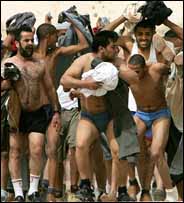
The front page of today’s New York Times has a tabloid flavor: a group of charging Palestinian men stripped down to their underwear and running shoes. The event on Tuesday was an Israeli raid on a Palestinian prison in Jericho. This time the walls came tumbling down due to tanks and bulldozers and the power was outside rather than inside the walls. At stake were six Palestinians previously held in Israel, remanded to the Palestinian authority under a shared incarceration process and now reclaimed by Israel. It seems the British and American monitors decided to leave in fear for their own safety and immediately (perhaps in as little as 10 minutes) the Israeli authorities moved in. As hard as it may be to believe, there are even deeper levels of trust in the volatile Arab-Israeli crisis. Fearing that Hamas might break the agreement, Israel decided to do a preemptive breaking of the agreement themselves.
Not surprisingly the response on the street was violent. Beyond the normal destruction of property, some 11 foreigners were kidnapped, including an American university professor. Everyone was released earlier today. Palestinian President Mahmoud Abbas hurridly returned from a trip to Europe to condemn the event. He was joined with condemnations by Jordan’s King Abdullah and Egyptian Foreign Minister Ahmed Aboul Gheit. As reported in Haaretz the Qatari ambassador to the UN proposed a resolution condemning the raid, but the United States immediately Boltoned to block this with a veto threat.
The politics of the issue are transparent, whether you side with the Israeli authorities or the Palestinians. First, the monitoring process broke down with no back-up. The British and Americans represented a pledge to keep the two parties from coming to blows. Had the monitors remained, it is doubtful the take-over would have happened. Second, in any case the Palestinians accused of terrorist acts remain in custody that ultimately is in the hands of the Israeli authorities. Third, by assuming that Hamas would release the prisoners Israel makes it clear — in the midst of an election of course — that it will under no circumstances trust Hamas. Ergo, Hamas becomes even more popular. The cycle of violence not only continues, it leads to even greater chance for more acts of violence.
But beyond the politics there is the dynamic of the picture taken by Baz Ratner for the AP. The caption reads: “Palestinians who stripped in response to Israeli orders tumbled out of jail compound yesterday in Jericho.†Clearly stated here is the fact that these prisoners were ordered to strip down as they left their cells. But consider that these are prisoners who have been monitored in a prison. What exactly could they hide in their clothes, apart from some measure of self-respect? The “strip search†is justified, understandably in many circumstances, as a way to prevent someone concealing a weapon or perhaps a suicide bomb. But it is hard to imagine weapons being made in the prison given the supervision of the monitors. Like the raid itself, the message that is lost on no Palestinian is one of utter humiliation.
Here is a question. Does humiliation work? Does forcing these men to strip without any justified need signal anything but the total disdain of Israel for Palestinians suspected of terrorist acts. If they are guilty, will this act make them rethink their actions or only serve to convince them that such violence is necessary no matter what the cost? If they are innocent, are they likely to turn into Mahatma Gandhis under such treatment. Did it work to put an Iraqi man on a box in Abu Ghraib and make him think he was about to be electrocuted? Did it work to put offensive images of the Prophet Muhammad in a daily newspaper in Denmark because of freedom of hate speech?
Beneath the image of Palestinian men clutching their clothes another story notes that 85 bodes of executed men were found in Baghdad in the past two days. These men were not just put to death, but their bodies showed evidence of torture. In one case of truck full of dead men was left parked at a busy intersection with a strict curfew and round-the-clock checkpoints. It is, of course, public display, the kind that has a long history in armed conflict. Sometime the victors impale the heads of the vanquished; other times it is the act of display which takes on a life of its own.
What we see on today’s front page is naked violence in the strict and loose sense of the term. In the Garden of Eden Adam and Eve felt shame when their inadequacies were exposed, but the crises in Palestine and Iraq fester with no apparent sense of shame. Perhaps it is time we strip search our own souls.
Daniel Martin Varisco